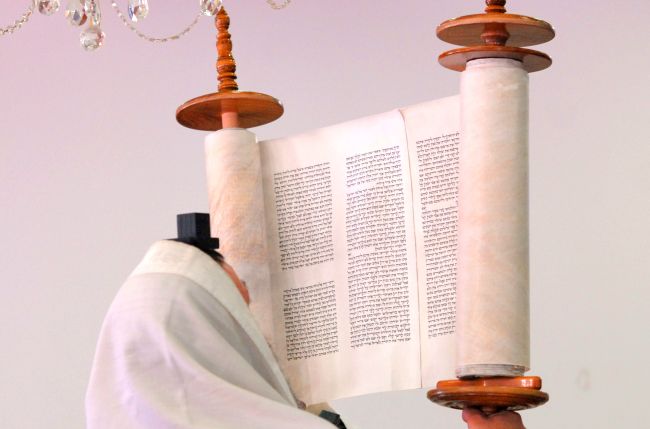Dedicated l’iluy nishmas Matisyahu ben Henoch
![]()

Reasonable Repetition
Sometimes, the Torah strikes us as repetitive. We are forced to wonder why the Torah felt it necessary to tell us the same thing twice, and to look more deeply to determine what we learn from the retelling.
Nowhere is this more striking than the story of Eliezer going to find a wife for Yitzchak in our reading this week. Even at the outset, the story of his devising a sign and meeting Rivka is told in great detail. But then Eliezer tells the full story to Besuel and Lavan, Rivka’s father and brother, and that full retelling is recorded in the Torah as well. The Torah does not simply say “Eliezer told them everything that had happened;” rather, it tells us everything Eliezer said.
One of the most crucial elements of the tale, the “test” which Eliezer devises in order to determine which woman G-d has sent for Yitzchak, is described four times: first, when Eliezer prays to G-d that the sign should come to pass, second, when Rivka emerges and immediately proceeds to fulfill the sign, third, when Eliezer tells Besuel and Lavan about his test, and fourth, when he describes for them how Rivka fulfilled his prayer! The Torah could simply have said, “and it came to pass, before he had finished speaking, that behold, Rivka came out… and she did according to all that found in the prayer of Eliezer to G-d…” And then, “and I prayed that G-d would show me a sign… and Rivka came out and did all in accordance with that sign…” and the Torah would be at least a paragraph and a half shorter. This is a cut any editor would have made, presented with this text.
But the Torah has no excess language. There are layers beneath layers of meaning, waiting for us to find them. In this case, the repetition seems so unnecessary that it sending a message of its own, telling us to look for more.
There is an interesting Medrash related to this, which Rashi (Rabbi Shlomo Yitzchaki) quotes at the point where Eliezer is telling Besuel and Lavan about the test he made. “Rabbi Acha said, ‘the simple conversations of the servants of the forefathers is more pleasing before the Omnipresent than the Torah of the children, for the parsha of Eliezer is repeated in the Torah, whereas many laws which are part of Torah itself are given only as hints.'” The Rabbis tell us many detailed laws which are part of Torah, and yet can only be found in the written document by using the various methodologies for comparing and analyzing the verses.
Concerning the stories of our forefathers, the Kanfei Nesharim elaborates: “when we concentrate and delve more deeply, we find within them many other lessons, intentions, and hints towards holy and great things, as we find in the books of early and later authorities who have written about them.” If these stories are worthy of being told in full – and even repeated numerous times – it must be that many great lessons may be learned. And indeed, this is what we find.
I found one brief example offered by the Bais HaLevi, Rabbi Yosef Dov Soloveitchik of Brisk. Eliezer comes to Besuel and Lavan and tells them that Avraham had instructed him to go “and take a wife for my son.” [24:38] But if we look earlier, we see that Avraham told him to go “and take a wife for my son, for Yitzchak.” [24:4] Why did Eliezer omit Yitzchak’s name?
For an answer, the Bais HaLevi looked at the behavior of many wealthy people in his day (which, unfortunately, remains true in some cases today). They would routinely offer large dowries in order to marry off their daughters to the sons of outstanding scholars. But if someone would offer a young man who was himself an outstanding student, likely to be a leading scholar in the next generation, they wouldn’t be interested. They valued Torah and scholarship, but from a distance. They wanted the honor of marrying off their daughter to the son of a leading scholar, but they weren’t interested in having their daughter leading a life of relative deprivation, married to a leading scholar.
When Avraham instructed Eliezer to find a young woman, Avraham said she should be “for my son,” meaning, appropriate as a daughter-in-law for someone of his nature and Divine service, but still more important, “for Yitzchak,” in accordance with Yitzchak’s own great characteristics and potential. But when Eliezer went to Rivka’s family, he recognized immediately that discussing Yitzchak’s character in any detail might blow the deal. So instead, he merely discussed the fact that Avraham, who was a prominent figure, was seeking a wife for his son.
Thus we learn to contrast the attitude of Besuel and Lavan, who were interested in the honor of having their daughter and sister married to the son of Avraham, with that of Avraham himself, who was more interested in finding a match which was inherently good for Yitzchak. This is a lesson which is relevant not just to parenting, but in many different areas of life. Are we ourselves more interested in doing that which is right, or doing that which merely makes us look good? This is just one of the lessons to be learned from one single word of the “repetitious” stories of our forefathers!
Good Shabbos
Rabbi Yaakov Menken
![]()
The Concept of Angels
See it at JewishAnswers.org
Question: When Sarah gave Hagar to Abram in order to fulfill what she thought was the prophecy that she would have a child, was he committing adultery by taking Hagar or just custom?
Answer: Abraham was not committing adultery. Remember, the Torah was not given yet. There was no obligation to follow the commandments yet at all. It happened to be that Abraham was a man of truth, so he followed the Torah, which he knew inherently.
Also, the Torah does not prohibit having more than one wife. It is Rabbinically prohibited, but not forbidden from the Torah. Today, we are not allowed to have more than one wife. That did not apply to Abraham.
All the Best, Rabbi Azriel Shreiber
![]()
A Thought on Chayei Sara – The Prayer Experience
By Rabbi Moshe Hauer
Hear it at TorahMedia.com
on May 1, 2020. In this role he serves as the organization’s rabbinic leader, heading its communal-oriented efforts and serving as its professional religious/policy leader and primary spokesman.
Prior to joining the OU, Rabbi Hauer served as the senior Rabbi of the Bnai Jacob Shaarei Zion Congregation in Baltimore, MD for 26 years, where he was active in local communal leadership in many areas, with an emphasis on education, children-at-risk, and social service organizations serving the Jewish community. Rabbi Hauer is an active teacher of Torah who led a leadership training program for rabbis and communal leaders, and was a founding editor of the online journal Klal Perspectives.
Rabbi Hauer received his rabbinic ordination and doctor of Talmudic law from Ner Israel. He received his master’s of science from John Hopkins University.
Recent Articles
See all of our recent additions
Browse all our articles on Toldos
Featured Article:
Eternal Bliss
By Rabbi Naftali Reich

One of the most meaningful and inspiring moments for us as teachers at Ohr Somayach is participating in our students’ wedding celebrations and standing with them under the chupah canopy. The poignant words of the songs and blessings recited under the marriage canopy tug at the heart, investing the moment with sanctity and awe. The ceremony begins with the chazzan’s melodious rendition of the piyut ‘Mi bon siach shoshan chochim,” attesting that only the Almighty can grasp the sublime whispers of a “rose among the thorns,” of the deep protected love that is nurtured between a choson and kallah. The blessings, too, reflect this theme.
The couple become espoused through the groom’s act of presenting an article of monetary value, traditionally a ring, to the kallah. The moment the groom slips the ring on the bride’s finger, the bond is cemented and joyous cries of mazal tov echo in the wedding hall…












